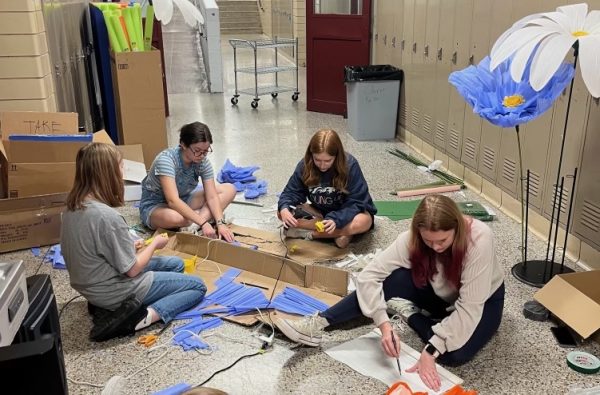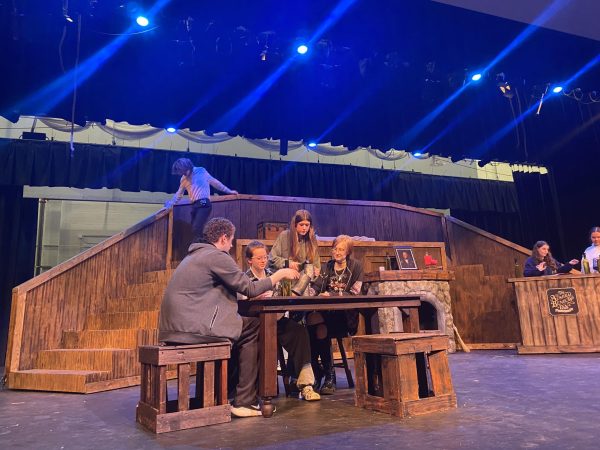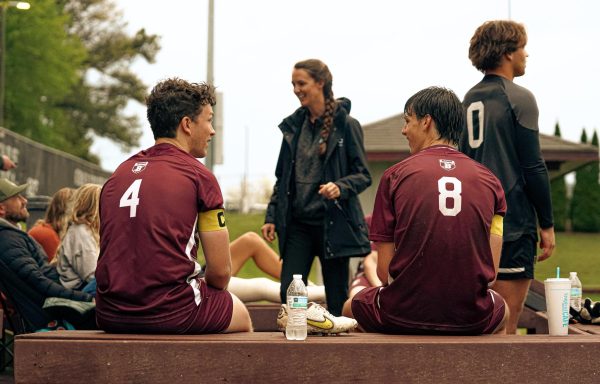Bearden senior, now a survivor of testicular cancer, looks to raise awareness
April 5, 2018
High school juniors are accustomed to battles – getting the ACT scores they need, motivating themselves to complete homework, figuring out where they will apply to college. But when Grant Moseley was a Bearden junior, he was fighting a far tougher battle.
On Dec. 21, 2016, Moseley was diagnosed with stage three testicular cancer.
He had previously noticed pain and swelling, so he informed his mom. Moseley went to an urgent care center and was prescribed antibiotics. Nothing changed, so he went to see a urologist at East Tennessee Children’s Hospital. An ultrasound showed that Moseley had a solid mass on his right testicle. It was discovered that the mass was cancerous, and he was then diagnosed.
“I was in shock, my mom was in total shock,” Moseley said. “I remember her jaw dropped. I still remember that moment. My personal reaction I was shocked and I just stayed calm, surprisingly. During the whole treatment, I just stayed calm and positive so that helped a lot.”
The day after being diagnosed, Moseley, now a senior at Bearden, had surgery in order to remove the cancer but remained upbeat and positive despite his situation.
“I joked and said I will be a one-ball Joe,” Moseley said.
Blood tests revealed that he would have to undergo chemotherapy. After learning this, he said goodbye to his friends and teachers at school and began homebound schooling. One of Moseley’s teachers would come to his house at least once a week in order to keep him on track to graduate.
Moseley had another surgery and then began chemotherapy. He did chemo almost every Friday and completed three rounds.
“The first and second round of chemotherapy were the hardest,” Moseley said. “Mainly because of nausea and not feeling up to it. The third round was the easiest one for me. I took every single anti-nausea medication they could offer me.”
When Moseley finally completed chemotherapy, he had a CT scan that showed his lymph nodes were still enlarged. He then had a RPLND (retroperitoneal lymph node dissection) surgery at UT Medical Center in May 2017 that lasted approximately seven hours.
“It was easier than chemo actually,” Moseley said. “Chemo was way, way, way harder than that surgery was. I recovered from the surgery faster than the chemo.”
Moseley recovered from his surgery quickly and was able to attend a Boy Scout summer camp four weeks later. He continued his recovery journey over the summer and was able to return to school for his senior year. Moseley has now been in remission for more than seven months.
Throughout his treatment, Moseley had immense amounts of support from multiple communities. This support, alongside his constant positivity and calmness, helped him greatly during this difficult time in his life.
“During the hospital stays, everybody is wonderful at East Tennessee Children’s Hospital,” Moseley said. “They are all awesome, and then I had a lot of family support. I had even church help me out, and I even had my teachers help me out.”
Now that Moseley is in remission, he and his family want to raise awareness for the disease. He is sharing his story in hopes that it will inspire other men to be more cautious and seek help if they need it.
His family is planning to create a way to spread awareness at the school so that students and parents can learn about the signs and symptoms.
“My family plans on having tables set up during basketball games and soccer games and sports games in general to raise awareness about this type of cancer because it is rarely, rarely, rarely talked about, and my family would like to have it talked more about so that more men and boys know what it is first of all and also know the warning signs of it,” Moseley said.
Alongside he and his family, Moseley encourages that the community spread awareness for this disease.
“The community could check and talk about it at doctor’s offices and they can also as I said, raise awareness during a sporting game and events,” Moseley said.
April is Testicular Cancer Awareness Month and Testicular Cancer Awareness Week began on April 1. These events were created in order to help people understand the risks and symptoms of this type of cancer. It inspires men to become advocates for their own health.
After battling testicular cancer himself, Moseley hopes to motivate other men to be aware. If they know something is wrong, they should tell someone and seek help.
“Testicular cancer is not talked about often,” he said. “I hope to change that and raise awareness about this terrible disease. It is the most common in men 15 to 30 years of age, but it can strike men at any age. This disease is highly curable if detected early. My hope is that raising awareness will make more boys and men do monthly self-exams.”







